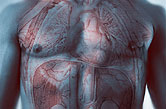Reduction in systolic, diastolic BP, total peripheral resistance at rest and during exercise
MONDAY, July 27, 2015 (HealthDay News) — Chronic supplementation with beetroot juice (BRJ), containing nitrate, has beneficial effects on the work of the heart in response to exercise, according to a study published online June 17 in the American Journal of Physiology: Regulatory, Integrative and Comparative Physiology.
Jae-Seok Lee, from Kyung Hee University in South Korea, and colleagues examined the effects of chronic supplementation with BRJ on cardiac output (CO), blood pressure (BP), total peripheral resistance (TPR), and the work of the heart in response to dynamic exercise. The effects of 15 days of BRJ and nitrate-depleted beetroot juice (NDBRJ) supplementation were compared in 14 healthy males.
The researchers observed an increase in plasma nitrogen oxides with BJR supplementation. BJR also correlated with a reduction in systolic BP, diastolic BP, mean arterial pressure, and TPR at rest and during exercise, compared with NDBRJ. There was also a decrease in rate pressure product during exercise, and an increase in CO at rest and the 30 percent workload (P < 0.05). Increases in the brachial artery diameter were induced by flow mediated dilation enhanced by BRJ.
“These findings suggest that BRJ can act as a dietary ergogenic supplement capable of enhancing oxygen delivery and reducing work of the heart, allowing exercise to be performed at a given workload for a longer period of time before the onset of fatigue,” the authors write.
Full Text (subscription or payment may be required)
Copyright © 2015 HealthDay. All rights reserved.








